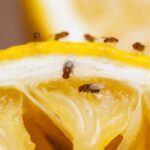Fruit flies can be found in homes, restaurants, supermarkets, and other places where food can potentially rot and ferment.
Fruit flies enter through holes in the walls or pre-laid eggs inside a piece of fruit. Fruit fly eggs are quite small, and adult fruit flies frequently lay them within fruits and vegetables.
Fruit flies may appear to arrive out of nowhere to infest your space, but this is due to how quickly they multiply and develop.
But why is that?
To answer this question, there’s a lot to discuss. Continue reading to learn important details about the life of a fruit fly so you can find out how to spot them.
Lifespan of Fruit Flies:
A single fruit fly lives for roughly a month and a half from the time it hatches until it reaches adulthood. After an adult female fruit fly mates, she lays a cluster of eggs. The critters that emerge from the eggs are known as larvae, and they are juvenile fruit flies that have yet to grow.
To accomplish this, the larvae will feed on organic matter (fruits, vegetables etc.) for a few days to store energy before migrating to a dark and dry location to enter the pupae stage. Because it normally takes place in a little gap that humans can’t reach, it’s tough to catch/recognize this process.
The important question now is: What causes Fruit flies ?
Because fruit flies lack teeth, they depend heavily on fluid to keep them alive. Since their brains can detect fermented fruit from miles away, they will always be drawn to sweet items found naturally.
Consider this: each time you unload a grocery haul in your kitchen, fruit flies arise out of nowhere. Whenever you’re drinking wine on a summer night, it only takes a few minutes for fruit flies to begin buzzing around the rim of your glass, desperate for a sip. Fruit flies, unlike most other species in the animal kingdom, are attracted to the smell of vinegar. The rationale for this is that wine, fruit, vegetables, and fermented, decaying organic matter are the fruit fly’s basic sources of nutrition. So, simply having these relatively common items in your home is like sending out an inviting atmosphere for these pests to make themselves at home.
But why can you spot these flies only in the summers?
It’s a common misconception that adult fruit flies end up dying in the cold, and that unhatched eggs are simply frozen in preparation for the following spring.
This isn’t all that far from the facts. According to a 2006 study, fruit flies go through a process known as diapause, which is essentially the insect equivalent of hibernation. At each stage of the life cycle, growth is halted, effectively freezing the species in time until it is warm enough to be active and feed again.
How to prevent fruit flies?
The most effective way of preventing the drain fly infestations is to eliminate their breeding and feeding grounds. Inside buildings, this would include cleaning the drain pipes, drain traps and the other plumbing system components in the attempt to eliminate the bacteria like gelatinous rotting, organic matter) that regularly form on plumbing surfaces. Drains Made Simple is your go to place if you want to get rid of fruit flies. Cleaning drains of fruit flies is an excellent service offered by DMS.
The Final Comment on Fruit Flies!
You can’t stop the consumption of fresh produce or a nice glass of rosé which are refreshing in the summer. You shouldn’t have to change your routine to accommodate the whims of a fruit fly colony.
DMS also offers commercial fly spray for restaurants like FFC-10 Fruit Fly Control, which is a “NATURAL” companion to your pest control program. Controls both flying and crawling insects. Spray directly on the pest wherever they are seen.
We’ve outlined the reasons for the sudden outbreak of fruit flies in this article so that you’re better prepared to deal with them if they pay a surprise visit to your home.

